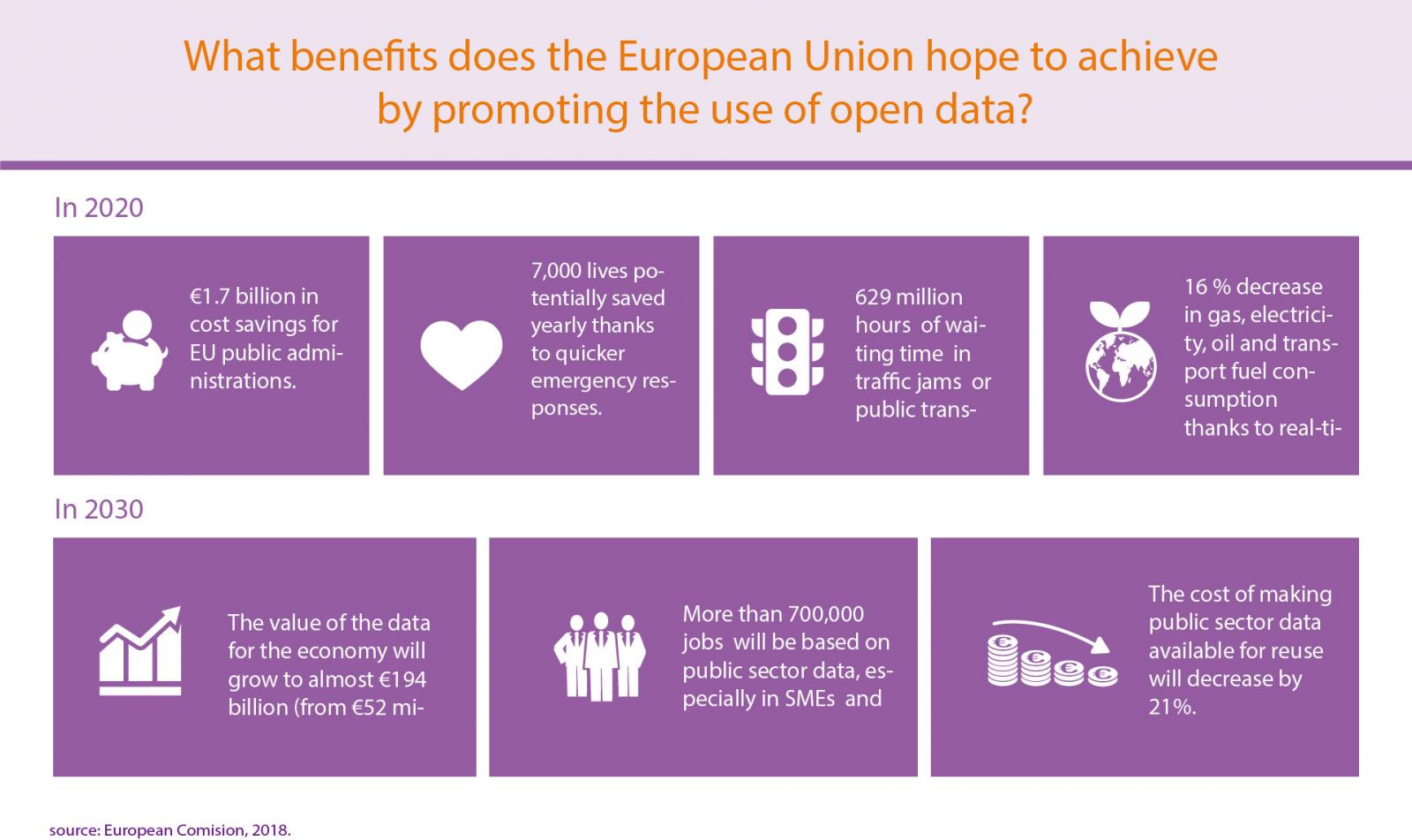
The European Union was created to facilitate commercial transactions between its member states, eliminating barriers and ensuring the free movement of goods, people and services. With the rise of data and the digital economy, the institution had to expand its scope beyond physical assets, and include among its functions the creation of a Digital Single Market that promotes the exchange of information in a secure way.
The public organisms do not stop generating data, which are a valuable raw material to favour economic growth. The power of public open data is evident according to European Union studies: more than 50% surveyed companies use open data to create new products and services; and a third of start-ups supported by ODINE would not exist without open data.
In order to facilitate the reuse of information from the public sector, Directive 2003/98/EC of the European Parliament and of the Council (PSI Directive) was created. It introduced provisions on non-discrimination, cost, exclusive agreements, transparency and licenses, among other aspects. In 2013 this directive was amended by Directive 2013/37/EU. The 2013 Directive incorporated the need to carry out a review of the initiative on accessibility and reuse of public information before July 18th, 2018, with the aim of increasing the amount of public sector data available for reuse, ensuring fair competition and easy access to markets based on public sector information, and enhancing cross-border innovation.
To carry out this review, a thorough analysis of other current directives (INSPIRE or Database Directive) has been carried out in order to be aligned. Likewise, a public hearing and an analysis of the impact on the economy of the changes introduced in 2013 has been carried out. During the hearing process, all interested parties, including public authorities and reusers (public, private, commercial and non-commercial) were invited to contribute
The conclusions have confirmed that the Directive has helped to stimulate the European economy, achieving its objectives. In addition, it has had a favourable impact on transparency, citizen empowerment, and public sector efficiency. However, they also indicate that there are still challenges to overcome in order to fully exploit the potential of public sector information for the European economy and society. Some of these challenges are related to the following aspects:
- Limited real-time access to data. More dynamic data should be provided in real time and more technical solutions developed to facilitate data usability.
- Charges about cost. Charge for reusing public sector data should not cost more than “the marginal costs for reproducing, making available and dissemination the open data”. However, a widespread practice of demanding much higher amounts has been found. This create market entry barriers for SMEs and startups.
- The lack of availability of high interest data, because they are in the hands of private operators. For example, data generated by companies providing public services (utilities, transport, etc.) or research data from public funding.
- The need to avoid exclusivity agreements. Public-private agreements can lead to situations in which public sector information is blocked.
- The relationship between the PSI Directive and certain related legal instruments.
Given these challenges, the Commission is in the revision process of the PSI Directive, regarding the following aspects:
- Stimulate the publishing of dynamic data and the uptake of APIs.
- Limit the exceptions allowing public bodies to charge for the reuse of their data more than the marginal costs of dissemination.
- Enlarge the scope of the Directive, including data held by public undertakings – in this case, charges for the reuse of such data can be above marginal costs for dissemination- and research data resulting from public funding.
- Strengthen the transparency requirements for public–private agreements involving public sector information, avoiding exclusive arrangements.
Until July 3th, the deadline is open for those who wish to provide their opinion on the different aspects included in the review.
In summary, the revision of the PSI Directive aim to continue promoting an open data ecosystem that allows a further step towards the creation of a Digital Single Market. With the new PSI Directive as a driver for the cross-border reuse of open data, it will be easier to start new data-based businesses, as well as to improve existing ones, with the consequent value for society, as shown in the following figure.
